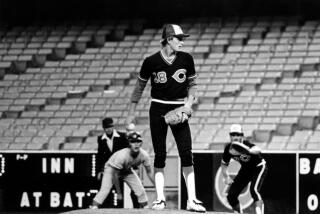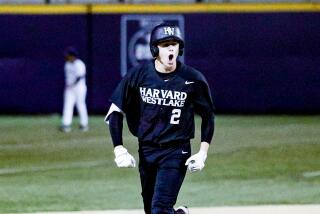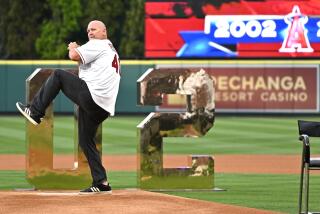No angels in this outfield
The spring baseball schedule had Burroughs High School’s varsity team playing its cross-town rival Burbank High this past Friday in what should have been the last game of the regular season.
But the contest, which might have launched Burroughs into the playoffs, never happened. The team’s season ended in mid-April, thanks to a boneheaded move by an assistant coach and a series of consequences that make for a rich little drama on crime and punishment.
According to Burroughs High Principal Emilio Urioste, the team was in Arizona back in mid-March when said assistant coach — reportedly in his mid-20s — provided beer to some of the players. When Urioste found out a few weeks later, he called in coaches and players and grilled them on the details.
Urioste then fired the entire coaching staff, including head coach John Schwer, even though Urioste was convinced that Schwer knew nothing about the beer drinking.
“We needed to have a fresh start,” Urioste told me when I asked why Schwer — whom Urioste called “a good man” — got chopped.
Urioste’s inquisition of the players, in one-on-one meetings, led to a number of confessions. The principal determined that 11 team members drank some beer in Arizona. Seven others convinced him they did not.
And yet, in a decision that led one attorney to threaten a lawsuit, all 18 team members were suspended. The 11 who drank were sent home for five days. The seven team members who didn’t were suspended for two days, apparently for not ratting out the others.
An additional four-week athletic suspension for the 11 meant that Burroughs didn’t have enough players left to field a team. So the season was lost, even for seven kids who had resisted temptation in Arizona.
When parents of the seven kids appealed, Urioste rescinded their two-day academic suspensions. Still, the baseball season was history.
Federal public defender Guy Iversen, a former Burbank resident and longtime youth baseball coach, flipped out when he heard what was happening at Burroughs. Serving pro bono on behalf of two players, he sent a caustic letter to Urioste and Burbank Unified School District Supt. Stan Carrizosa, accusing them of overreacting, violating the rights of team members and sending all the wrong messages.
As Iversen and some of the parents contended, even the players who drank beer did so only after an adult representative of the school declared it was Miller time. Sure, they should have said no, but they’re kids, and when a coach pulls some cold ones out of the bag and blesses the party, doesn’t that constitute coercive force — or at least a tough offer to refuse?
“Fire the assistant coach for sure,” Iversen wrote. “Suspend the head coach for a few games and those that drank for a few days. Then, get back on the field, play ball, heal and learn from our mistakes.”
Mitchell Kenney, father of the Burroughs shortstop, told me he agreed there had to be penalties, but he wonders about the severity. “All [my son] talked about for years was his last senior game. All taken away in a day. My son made a mistake, but to take away the whole season is tough.”
Iversen says that punishing kids for not reporting an alleged incident is a violation of their 1st Amendment rights. Just as you have a right to speak, he explained, you have a right not to speak. Iversen also challenged the legality of having kids answer questions about an alleged crime — the underage drinking — without parental or legal counsel.
Iversen suggested in his letter that the Burroughs team be allowed to suit up for the big rivalry Friday against Burbank. As a onetime high school baseball player myself, I took up the cause last week, calling the principal and superintendent to make the case for the kids — and I wasn’t just doing it because it would make for a good column ending.
But the idea was shot down.
Urioste and Carrizosa insisted that they had to enforce existing policies and send a strong message to players about honesty, responsibility and accountability. Independent of each other, they told me they had to think also about what could have happened.
“If there were a funeral instead of suspensions, there would have been cries from every corner of the community,” said Carrizosa.
Well, sure, but a fair judge doesn’t impose penalties based on what might have happened.
Fired head coach Schwer, who was reduced to tears over his dismissal and is sorry the players had their season taken away, told me he’s “just trying to get through it.” His attorney, who’s exploring the coach’s options, challenged the suggestion by Urioste and Carrizosa that Schwer either should have known about the drinking or should have run the team in such a way that it never happened.
I gave Carrizosa and Urioste a hypothetical — if they were on a field trip with deputy administrators and students, and entirely unbeknownst to them, the deputies bought beer for students, should Carrizosa and Urioste be fired?
They both said yes, but what else could they say?
Last week, parents of the players, as well as students I spoke to at Burroughs, seemed ready to move on. That’s understandable, but the teachable and debatable themes in this story could fill many a class hour at Burroughs and beyond.
Who betrayed whom, and how?
Can punishment be so punitive as to undermine its purpose?
When is it OK for adults to steal a child’s right to remain silent?
I’ll leave the last question to attorney Iversen, who wonders why the adults can’t step aside now that they’ve made their point and let the kids suit up and play one last game against their big rival, even though it’s too late to count.
“Are we, as a society, better off not playing that game at this point?”
More to Read
Start your day right
Sign up for Essential California for news, features and recommendations from the L.A. Times and beyond in your inbox six days a week.
You may occasionally receive promotional content from the Los Angeles Times.







